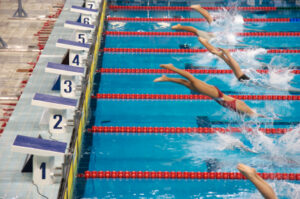SAT / ACT Pacing: Are You Working Too Fast?
 Timed tests make some students feel as if they are on the starting block at an Olympic race waiting for the gun to fire so they can speed through the section. Unfortunately the SAT and ACT are awarding points for accuracy not speed. Many students undermine their scores by failing to control their SAT or ACT pacing.
Working Too Fast Hurts Focus
These standardized college admissions tests are not self-paced. Students who work too quickly and finish early are not permitted to move on to the next section; they have to sit and wait until time is called. With some students finishing 5, 10, even 20 minutes early, the sit and wait is a time to lose momentum and focus.
Hints:
If you finish a section more than a minute or two early, you need a strategy to maintain focus:
Timed tests make some students feel as if they are on the starting block at an Olympic race waiting for the gun to fire so they can speed through the section. Unfortunately the SAT and ACT are awarding points for accuracy not speed. Many students undermine their scores by failing to control their SAT or ACT pacing.
Working Too Fast Hurts Focus
These standardized college admissions tests are not self-paced. Students who work too quickly and finish early are not permitted to move on to the next section; they have to sit and wait until time is called. With some students finishing 5, 10, even 20 minutes early, the sit and wait is a time to lose momentum and focus.
Hints:
If you finish a section more than a minute or two early, you need a strategy to maintain focus:
- Do NOT put your head down. You don’t want to power your brain from off to full-speed at the beginning of each section.
- Do NOT “check your work.” Students who go back to “check” after finishing a section tend to do more harm than good. If you intended to review questions, do so, but once you are finished further review usually means second guessing correct answers.
- Relax, but keep sharp. Stay awake and alert while taking a short rest time.
- Determine your own “speed limit.” How quickly can you work each type of problem while still maintaining your accuracy?
- Before you take the real test, take a timed practice test.
- Take time to write out complicated problems, underline key terms, sketch out figures, reread the question or passage, and think.
- Don’t feel as if you need to keep pace with everyone else. Don’t hurry just because you hear other test takers turning the page or bubbling in answers. Set your own speed.